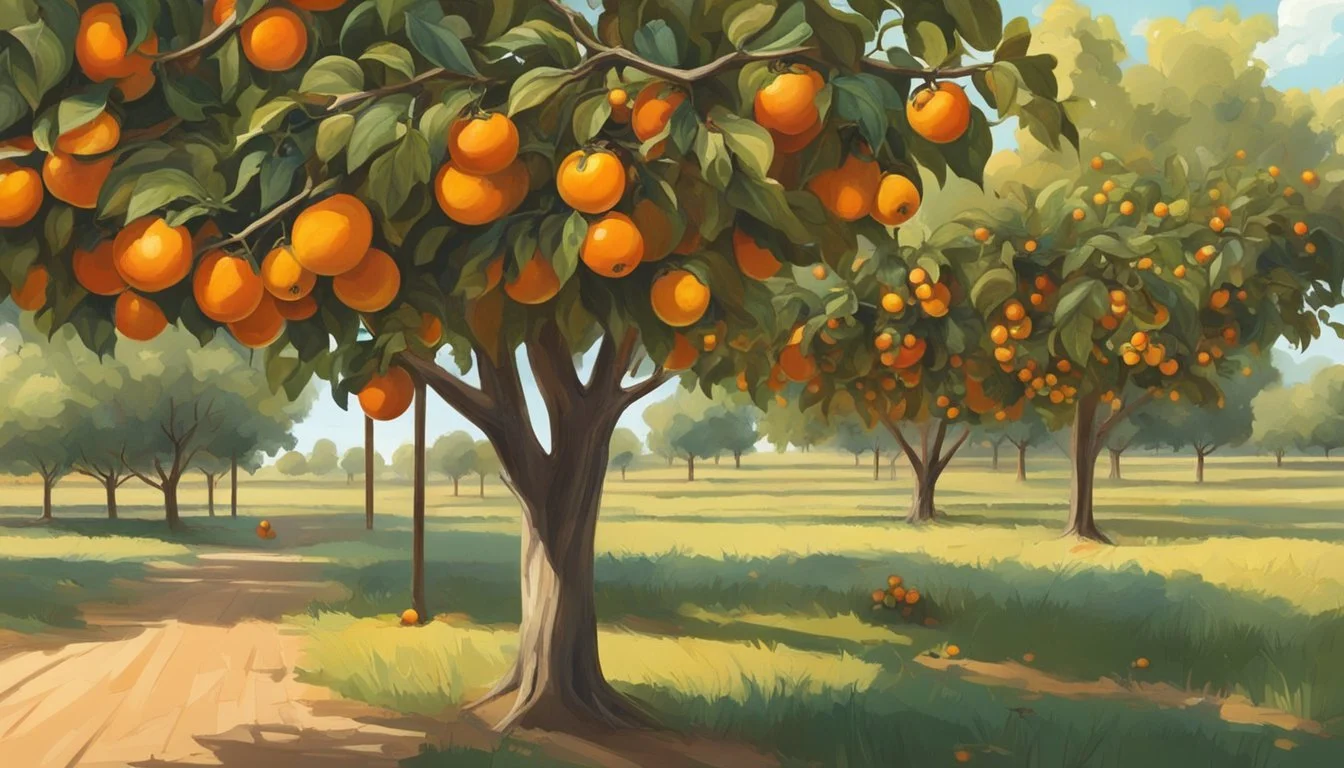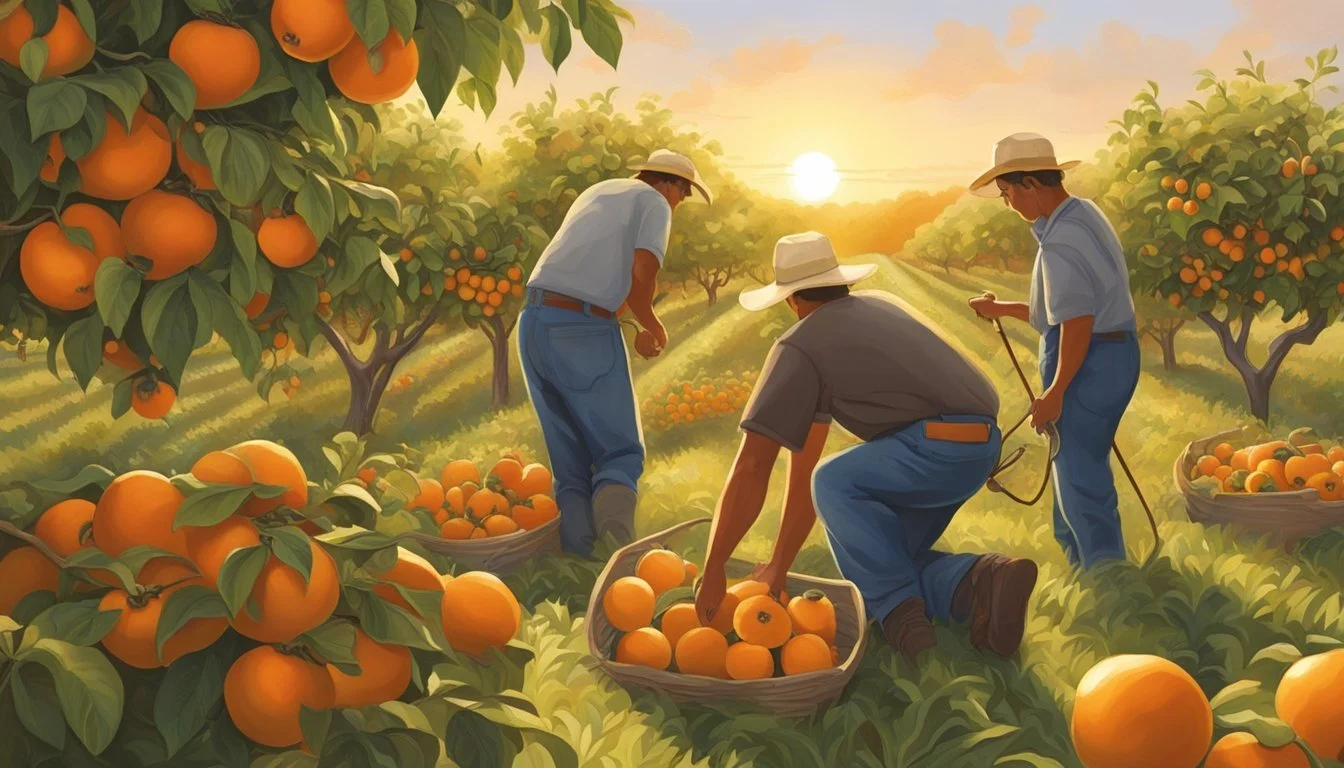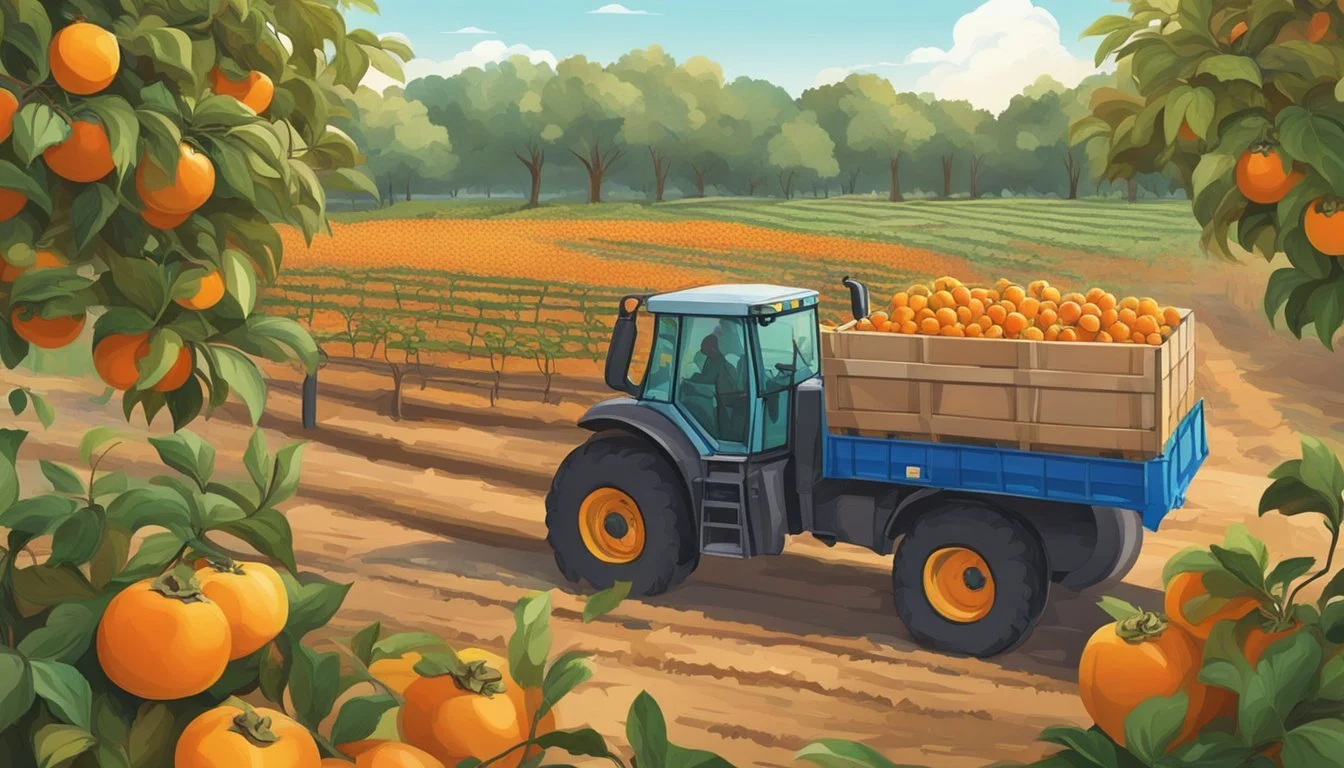Persimmon Picking Texas
Persimmon Picking Techniques and Seasonal Guide
In the heart of Texas, away from the hustle and bustle of city life, lies a rich tradition of farm-to-table experiences that beckon to those seeking authentic, locally-sourced fresh produce. Among these rural treasures are persimmon farms, where the sweet fruit of the persimmon tree offers a unique pick-your-own opportunity for families and food enthusiasts. With a variety of both astringent and non-astringent persimmons available, these farms provide a direct connection to the seasonal fruits that often bypass the produce aisle.
Amidst the vast skies and fertile soils of South Texas, these persimmon farms not only contribute to the diversity of the local economy but also serve as a reminder of the agricultural richness of the region. Visitors to farms like Blase Family Farm and Pecan Creek Strawberry Farm can indulge in the pleasure of selecting their own persimmons right from the tree. This hands-on practice aligns with the growing demand for organic and sustainable practices in agriculture, offering a tangible understanding of where our food comes from.
The experience extends beyond the simple act of picking fruit. It's an educational journey about the varieties and uses of persimmons, from the native Diospyros texana to introduced Asian varieties. Beyond persimmons, these farms often host an assortment of other fruits and farm activities, contributing to a broad agricultural education. It's an opportunity for visitors to appreciate the wider picture of Texas's bountiful land, engaging with farm animals, enjoying homemade treats like blueberry lemonade, and learning how to incorporate fresh, seasonal produce into their diet in the most delightful ways.
Persimmon Picking at Blase Family Farm
In the heart of Texas, Blase Family Farm offers a unique opportunity for visitors to enjoy persimmon picking, showcasing the farm's commitment to freshness and organic practices. Engage with nature and experience the journey of fruit from tree to table.
The Texas Persimmon Tree and Fruit
The Texas persimmon, Diospyros texana, is a fruit tree native to South Texas, revered for its hardiness and sweet, edible fruit. These attractive trees are perfectly suited to the region's soils and climate, producing a bulbous fruit that when ripened, exhibits a deep, almost black hue. The small-to-medium size fruit, while sometimes astringent when unripe fruit, becomes succulently sweet once it matures to temperate fruit and pounds of fruit.
What to Expect Persimmon Picking at Blase
Blase Family Farm operates as a pick-your-own farm, inviting visitors to select and harvest their own fresh produce. When arriving for a day of persimmon picking, guests can anticipate:
Hours: Updated seasonally, typically open mornings and evenings.
Admission: Usually a nominal entry fee; check for current rates.
Harvesting: Buckets provided for picking; pay by the pound for fruit taken home.
Guests can expect a family-friendly experience amidst the farm's sprawling acreage, caressed by the region's gentle breeze. The process of handpicking persimmons straight from the tree is not only enjoyable but ensures you leave with the freshest fruit possible.
Cooking with Fresh Persimmons
Freshly-picked persimmons from Blase Family Farm are a versatile ingredient for a wide variety of dishes. Whether in simple, fresh salads, blended into creamy persimmon pudding, or baked into aromatic breads, they add a unique flavor characteristic of Texas' bountiful produce aisle. For those inclined to culinary exploration, Blase's persimmons can transform into inventive recipes like:
Persimmon Pudding: A traditional dessert with rich flavors, using sugar, cream, and a hint of cinnamon.
Salads and Salsas: Adds a sweet touch to salads or a tang to salsas with its vibrant flavor.
The persimmon's flexibility in the kitchen allows both amateur cooks and seasoned chefs to incorporate this seasonal fruit into their repertoire, enhancing meals with its distinct taste profile.
More Fruit Trees & Produce in Texas
Texas offers a cornucopia of fruit trees and produce beyond persimmons, ripe for exploring. From peach orchards thriving in its climate to diverse produce available at farmers markets, Texas agriculture brims with freshness and variety.
Peach Orchards in the Texas Climate
The warm Texas climate is particularly well-suited for peach orchards, with the Hill Country being a notable hub for this sweet, juicy fruit. Freestone and clingstone peaches thrive on these sunny slopes, resulting in a bountiful harvest that peaks around May through August. Peaches become a central attraction at numerous pick-your-own farms, enticing visitors with the prospect of fresh-picked fruit perfect for pies and preserves.
Berry Farms for Blueberries, Blackberries, More
Berry farms dot the Texan landscape, with blueberries (how long do blueberries last?) and blackberries (how long do blackberries last?) being star performers. Pick-your-own options provide a family-friendly activity where buckets of berries are transformed into summer delights such as blueberry lemonade and blackberry cobbler. Farms like Pecan Creek Strawberry Farm offer these seasonal fruits, which promise a combination of sweetness and tanginess, making them a popular choice for fresh eating and homemade popsicles.
Organic & Local Produce at Farmers Markets
Farmers markets across Texas serve as community linchpins, offering a vast array of organic and locally grown produce. The trend of farm-to-table eating is strongly supported here, with markets often featuring organic practices and showcasing everything from ripe avocados to artisanal cheese and cream products. These markets are not only about fresh produce but also about connecting consumers with growers like Jill Blase from Blase Family Farm.
Range of Fruits & Veggies Growing in Texas
Texas' geographic and climatic diversity allows for a wide variety of fruits and vegetables to flourish. Beyond persimmon trees and berry plants, one can find an assortment of edible fruits from plums to seedless varieties of other fruits. Certain areas are ideal for cultivating less common but highly prized varieties, such as the Texas native persimmon, Diospyros texana, known for its small, black, edible fruit and its role as an attractive tree in both private and public gardens. The range is vast, from backyard fruit gardens to large-scale organic farms, all contributing to a vibrant produce aisle year-round.
Planning Your Farm Fresh Produce Trip
Embarking on a trip to pick persimmons in Texas offers a blend of agricultural education and outdoor fun. With careful planning, families can enjoy fresh produce straight from the tree while experiencing the unique charm of Texas farms.
Farm Hours, Directions & Logistics
Farm Hours: Before visiting, check the specific hours of operations as they can vary by location and season. Many farms open early to avoid the midday heat and may close during inclement weather.
Directions: Farms are spread across counties in South Texas and beyond. Use GPS or farm-provided maps for accurate directions. Availability of delights like Diospyros texana, known locally as the Texas Persimmon, and other edible fruits often depends on the region.
Logistics: Inquire ahead for any entry fees or produce pricing, which is often by weight. Pack essentials such as water, hats, and sunscreen for comfort and protection.
Fun Family Activities at the Farms
U-Pick Farms: Picking your own persimmons is a popular activity, with farms like Blase Family Farm and Pecan Creek Strawberry Farm offering extensive fields of ripe, sweet fruit amid scenic landscapes.
Educational Tours: Some farms also provide a glimpse into organic farming practices and sustainable agriculture through guided tours.
Additional Attractions: From meeting farm animals at Bonton Farms to enjoying ready-made treats like blueberry popsicles at Storm Farms, the activities add up to a memorable family outing.
Tips for Picking Ripe Produce
To ensure you select the best persimmons:
Look for fruit that is deep orange and slightly soft to the touch, indicating ripeness.
Gently twist the fruit off the branch rather than pulling to avoid damage to the persimmon tree and the fruit itself.
Enjoying the Charm of Texas Farms
Local Offerings: Beyond persimmon picking, many farms have farm stands or farmers markets where you can purchase a variety of fresh produce or artisanal foods like peach orchards' ice cream and traditional puddings.
Scenic Beauty: Enjoy the wide open spaces and fields, often with additional fruit trees and plants that make for an attractive backdrop, perfect for family photos and immersing in the tranquility of rural Texas.
Past, Present & Future of Texas Agriculture
Texas agriculture has rich traditions and innovative futures. This section explores how fruit farming, specifically persimmon production, has evolved in the Lone Star State and what lies ahead.
Brief History of Fruit Farming in Texas
The legacy of fruit farming in Texas dates back to the settlement days, with peach orchards and pecan trees among the first to be cultivated in South Texas. Over time, an assortment of fruits including plums, blackberries, and persimmons have been added. Diospyros texana or Texas persimmon, native to the region, has been a consistent part of the agricultural landscape, often found in local farmers markets.
Modern Growing Practices
Today's fruit farms, such as Blase Family Farm and Pecan Creek Strawberry Farm, utilize both traditional farming methods and modern organic practices. Pioneering pick-your-own farms have gained popularity, contributing to the fresh produce market and encouraging local participation in agriculture. These farms offer a variety of seasonal fruits, establishing a direct connection between consumers and the produce aisle.
Hours: Most pick-your-own farms have specific hours for visitors to come and pick fresh fruits.
Produce: Farms offer a wide variety of edible fruit, with persimmon trees being an attractive choice for their sweet fruit.
Sustainability & Innovation in Texas Farms
With sustainability at its core, Texas agriculture is also embracing innovative practices to ensure a resilient future. Regenerative farming, focusing on soil health and carbon sequestration, is aiding in the fight against climate change. This is reflected in the vitality of urban farms like Bonton Farms which, in addition to fruit & nut resources, contribute to community well-being. Texas farms are poised to adapt and continue thriving despite challenges such as land development pressure, ensuring the availability of fresh produce like the astringent fruit of the persimmon for generations to come.





